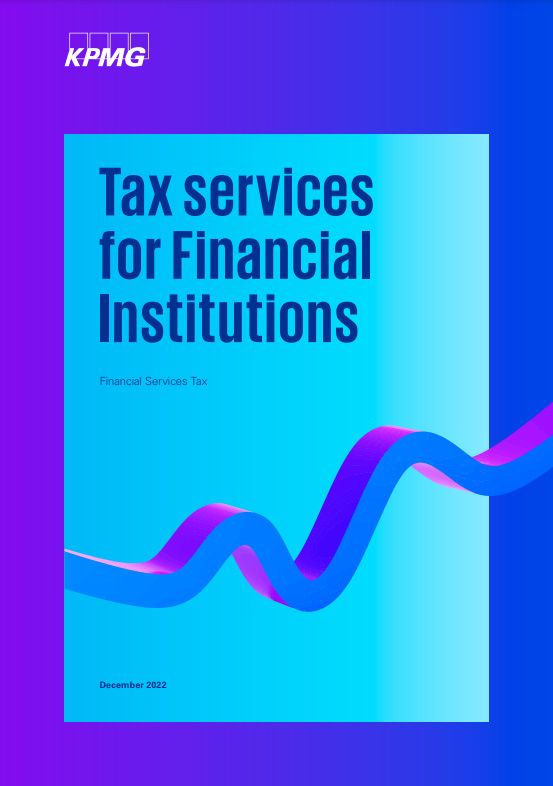Financial services institutions are ever more exposed to the challenges of today's complex tax environment. Successfully navigating the challenges in this environment requires custom-made solutions.
Our interdisciplinary team possesses the required knowledge of Swiss and international taxes and a profound understanding of today’s business and regulatory environment.
Our team is dedicated to serving clients in all of Switzerland and internationally and has offices in Zurich and Geneva.
We can assist you with a wide range of topics and have extensive experience in advising financial services institutions, including
- Banks
- Dealers/brokers
- Asset managers
- Fund administrators
- Insurance companies
- Trust companies
- Pension funds
- Fintech companies
Our services for financial institutions
KPMG's expertise and services
Tax compliance services for financial institutions
We assist financial institutions with all aspects of tax compliance, including Swiss corporate income tax, withholding tax, VAT, stamp taxes and other Swiss taxes, from the preparation of the tax return to the dealings with the tax authorities.
We leverage from technology, in particular KPMG’s Digital Gateway, to streamline the tax compliance process.
Thomas Brotzer
Head Financial Services Tax Switzerland, Global Head Insurance Tax, Member of the Board of Directors
KPMG Switzerland
Financial services tax advisory support
We assist with the complex tax challenges in today’s financial services environment, providing pragmatic solutions that meet legal and regulatory requirements and industry best practice.
This includes
- Mergers & acquisitions (tax due diligence)
- Structuring / restructuring
- Tax audits
- Tax rulings / tax opinions
- Health checks
- Tax accounting
- Tax classifications of financial instruments using our "Automated Tax Sections" technology - see our video for more information
- Tax suitability analysis of investment products (Tax Guides)
- Tax risk assessments / tax risk management
- Transfer pricing support
- Ongoing tax hotline
- Tax treatment of digital assets (blockchain / crypto / Distributed Ledger Technology (DLT))
Grégoire Winckler
Partner, Financial Services Tax
KPMG Switzerland
Operational taxes (incl. QI, FATCA & AEOI)
Our team possesses many years of experience in assisting Swiss and international clients with all aspects of the U.S. Qualified Intermediary ("QI"), Foreign Account Tax Compliance Act ("FATCA") and Automatic Exchange of Tax Information ("AEOI") regimes, as well as all other operational taxes. In particular, we provide:
- Ongoing compliance and reporting support
- QI/FATCA periodic reviews
- Responsible Officer certification support (see our latest survey results here)
- Health checks
- Policy documents & client onboarding forms
- Risk control frameworks
- Flowcharts and checklists
- Trainings tailored to the specific needs of your organization
- Withholding tax / stamp tax / transaction tax support
Jason Zücker
Director, Financial Services Tax
KPMG Switzerland
Asset management tax services
We assist asset managers and pension funds with a broad range of tax services, including:
- Swiss investor tax reporting (see our flyer)
- Fund structuring / re-structuring
- Investment reviews / tax due diligences
- Swiss and foreign withholding tax reclaims
- Swiss stamp tax analysis
- VAT analysis
- Transfer pricing support
Chris Goddard
Director, Financial Services Tax
KPMG Switzerland
Tax litigation
Whilst we work closely with our clients to prevent tax disputes, we provide dedicated and pragmatic advice to our clients to support them from the moment a tax dispute arises until it is settled.
We defend the interests of Swiss and foreign financial institutions in tax disputes before the Swiss Federal Supreme Court, Federal Administrative Court and cantonal courts.
Charles Hermann
Partner, Financial Services Tax
KPMG Switzerland
Multishore tax reporting (MTR)
KPMG Switzerland offers a successful tax compliance technology called “Multishore Tax Reporting” (MTR), which provides an easy and efficient solution to produce automated tax reports for Swiss and international clients of Swiss banks.
To learn more about our Multishore Tax Reporting click here.
Heiko Kubaile
Partner, Head of German Tax & Legal Center and Head Multishore Tax Reporting
KPMG Switzerland
Transfer Pricing Services for financial institutions
We assist financial institutions with all transfer pricing aspects. Our dedicated Financial Services Transfer Pricing experts will help you to review your transfer pricing setup and to identify risks and opportunities related to the specific intra-group transactions in the financial industry. We can support you in planning sustainable and pragmatic transfer pricing systems adequately to your business needs. Finally, we can also support compliance and manage controversy cases (tax audits, Advance Pricing Agreements between tax authorities, rulings, etc.).
To learn more about it, click here: Transfer Pricing Services.
Gerhard Foth
Partner, Global Transfer Pricing Services
KPMG Switzerland
BEPS 2.0
We assist financial institutions to understand the tax impact of the implementation of Profit Allocation and Nexus rules (Pillar 1), and Global Minimum Taxation (Pillar 2).
We provide insights into the key challenges which arise with the introduction of BEPS 2.0 and find clear answers to the questions raised by the model rules. In particular, we can offer:
- Workshops
- Impact assessments and gap analysis
- Process definition and structuring
- Project implementation
- Trainings
Click here to learn more about BEPS 2.0.
Thomas Brotzer
Head Financial Services Tax Switzerland, Global Head Insurance Tax, Member of the Board of Directors
KPMG Switzerland
IFRS 17
We assist insurance companies with the implementation of the new insurance accounting standard of IFRS 17 from a tax perspective. This includes:
- Impact assessments (incl. recognition, measurement & disclosure)
- Analysis of the interaction between IAS 12 (income taxes) and IFRS 17 (Insurance contracts) insurance for the individual case (e.g., treatment of policyholder taxes and impacts on fulfilment cashflow, etc.).
Click here to learn more about IFRS 17.
Markus Portmann
Director, International Corporate Tax
KPMG Switzerland
DLT
We support companies in the financial services sector with the tax-efficient and tax-compliant execution of their transactions and business activities related to DLT and blockchain technologies. Our services include amongst others:
- Clarifying the correct VAT treatment and data requirements for all banking services around digital assets (wallet services, custody, trading, staking etc.)
- Supporting the issuance of tokens (Profit tax, Withholding tax, Stamp transfer tax, VAT)
- Assisting with the qualification of tokens for Swiss tax purposes
- Assessing whether transactions involving digital assets are subject to Stamp transfer tax or Withholding tax
- Providing solutions around digital assets / transactions tax reporting & account statements
- Evaluating the tax treatment of investments in crypto assets by individuals
- Providing support regarding the readiness for information exchanges on digital assets
- Providing tax advice with establishing crypto funds
Click here to learn more about the topic of DLT or our services in this area.
Thomas Brotzer
Head Financial Services Tax Switzerland, Global Head Insurance Tax, Member of the Board of Directors
KPMG Switzerland












